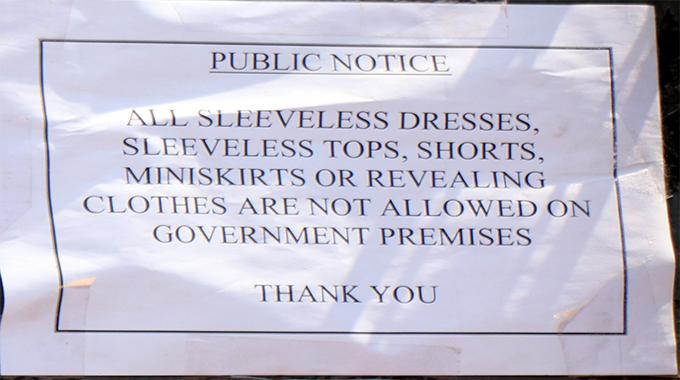News / National
VID bans revealing clothing at its depots
24 Oct 2024 at 06:57hrs |
0 Views

The Vehicle Inspectorate Department (VID) has implemented an immediate ban on visitors dressed in revealing clothing, such as shorts, sleeveless tops, and miniskirts, at all of its depots across the country. The move has generated mixed reactions from the public, with some applauding the decision while others criticize it as discriminatory.
Notices outlining the new dress code policy were posted at VID depots nationwide, including in Bulawayo, where two signs at the entrance clearly state: "All sleeveless dresses, sleeveless tops, shorts, miniskirts or revealing clothes are not allowed on Government premises."
Although the VID insists it is simply enforcing a long-standing Government policy on appropriate attire in public offices, the ban has stirred debate. One VID employee in Bulawayo, who spoke on condition of anonymity, said the change was prompted by complaints from male examiners and inspectors. Some male staff members reported feeling sexually harassed by clients arriving for road tests in what they considered inappropriate clothing.
"You won't believe it, but we once had a learner driver who was scantily dressed, and when a strong wind blew, it lifted her dress, revealing everything," the official said. "In some cases, women wearing miniskirts experience further exposure while changing gears, which creates an uncomfortable situation for male inspectors."
VID National Deputy Director, Mrs. Eustina Nyathi, confirmed the enforcement of the dress code. She emphasized that this was not a new law but rather the application of an existing government regulation, similar to the dress codes enforced in courtrooms. "The dress code issue is not a new thing. If you go to the courts, there is a certain fashion that one has to wear, and if you are not in sync with that, you will not be allowed in," she explained.
Mrs. Nyathi also noted that the decision to enforce the dress code came after the department received several complaints from both staff and clients regarding inappropriate attire during driving tests.
However, some have criticized the new enforcement, calling it discriminatory. Bulawayo City's Ward 17 Councillor, Sikhululekile Moyo, argued that the policy unfairly targets women and should be rescinded. "This is discriminatory, no two ways about it. Why should they target females? They must inform us how exactly they want us to dress because what may be appropriate for me may be viewed as revealing to someone else. This position must be reversed," said Clr Moyo.
The debate continues as the public and government grapple with balancing professional standards with individual freedoms in public spaces.
Notices outlining the new dress code policy were posted at VID depots nationwide, including in Bulawayo, where two signs at the entrance clearly state: "All sleeveless dresses, sleeveless tops, shorts, miniskirts or revealing clothes are not allowed on Government premises."
Although the VID insists it is simply enforcing a long-standing Government policy on appropriate attire in public offices, the ban has stirred debate. One VID employee in Bulawayo, who spoke on condition of anonymity, said the change was prompted by complaints from male examiners and inspectors. Some male staff members reported feeling sexually harassed by clients arriving for road tests in what they considered inappropriate clothing.
"You won't believe it, but we once had a learner driver who was scantily dressed, and when a strong wind blew, it lifted her dress, revealing everything," the official said. "In some cases, women wearing miniskirts experience further exposure while changing gears, which creates an uncomfortable situation for male inspectors."
Mrs. Nyathi also noted that the decision to enforce the dress code came after the department received several complaints from both staff and clients regarding inappropriate attire during driving tests.
However, some have criticized the new enforcement, calling it discriminatory. Bulawayo City's Ward 17 Councillor, Sikhululekile Moyo, argued that the policy unfairly targets women and should be rescinded. "This is discriminatory, no two ways about it. Why should they target females? They must inform us how exactly they want us to dress because what may be appropriate for me may be viewed as revealing to someone else. This position must be reversed," said Clr Moyo.
The debate continues as the public and government grapple with balancing professional standards with individual freedoms in public spaces.
Source - The Chronicle
Join the discussion
Loading comments…



























